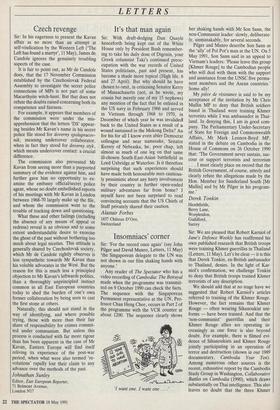LETTERS Czech revenge
Sir: In his eagerness to present the Kavan affair as no more than an attempt at self-vindication by the Western Left (`The Left has found a martyr', 11 May), James de, Candole ignores the genuinely troubling aspects of the case.
It is fair to point out, as Mr de Candole does, that the 17 November Commission established by the Czechoslovak Federal Assembly to investigate the secret police connections of MPs is not part of some Macarthyite witch-hunt. But that does not refute the doubts raised concerning both its competence and fairness.
For example, it appears that members of the commission were under the mis- apprehension that the letters 'DS' appear- ing besides Mr Kavan's name in his secret police file stood for doverny spolupracov- nik, meaning undercover collaborator, when in fact they stood for doverny styk, which means undercover contact: a crucial difference.
The commission also prevented Mr Kavan from seeing more than a purported summary of the evidence against him, and further gave him no opportunity to ex- amine the embassy official/secret police agent, whose no doubt embellished reports of his meetings with Mr Kavan in London between 1968-70 largely make up the file, and whom the commission went to the trouble of tracking down and questioning.
What these and other failings (including the absence of any means of appeal or redress) reveal is an obvious and to some extent understandable desire to exorcise the ghost of the past without bothering too much about legal niceties. This attitude is generally shared by Czechoslovak society, which Mr de Candole rightly observes is less sympathetic towards Mr Kavan than his voluble advocates in the West. But the reason for this is much less a principled objection to Mr Kavan's leftwards politics, than a thoroughly unprincipled instinct common in all East European countries today to shed the burden of one's own former collaboration by being seen to cast the first stone at others.
Naturally, this should not stand in the way of identifying, and where possible trying, those with more than their fair share of responsibility for crimes commit- ted under communism. But unless this process is conducted with far more rigour than has been apparent in the case of Mr Kavan, Eastern Europe will find itself reliving its experience of the post-war period, when what were also termed 're- volutions' rapidly lost their claim to any advance over the methods of the past.
Johnathan Sunley Editor, East European Reporter, 71 Belmont Avenue, London N17


























































 Previous page
Previous page